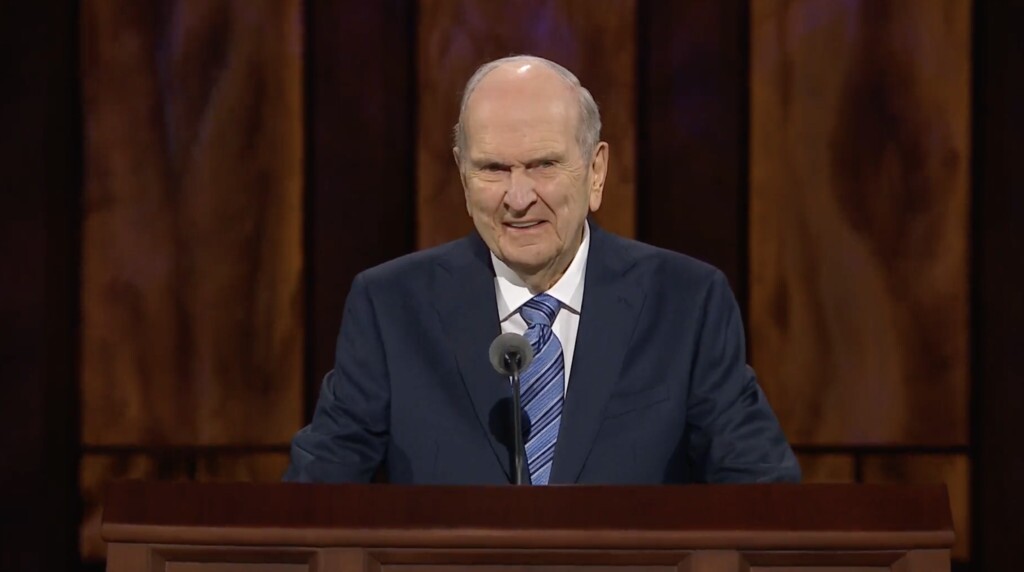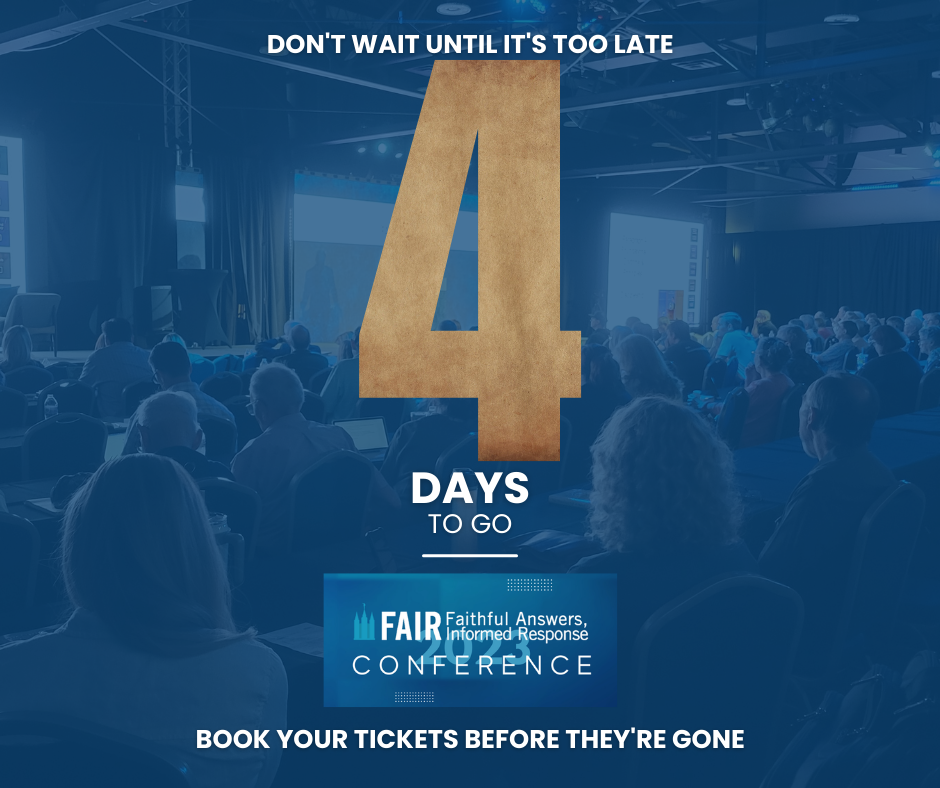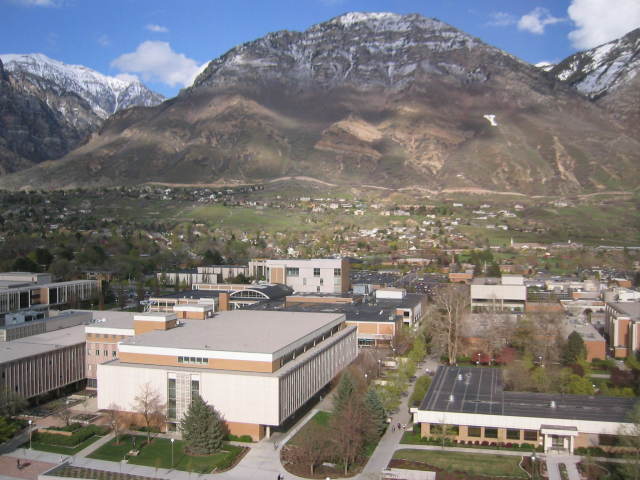“God loves all of us. He loves those of different faiths and those without any faith. He loves those who suffer. He loves the rich and poor alike. He loves people of every race and culture, the married or single, and those who experience same-sex attraction or identify as gay, lesbian, or bisexual. And God expects us to follow His example.”[1] In light of the fact that 4 out of 10 Americans now report that some of their close friends or family members are gays or lesbians, it’s increasingly important to know how best to support our loved ones while staying true to our faith. [Read more…] about 4 days left to buy conference tickets!
Homosexuality
Beyond the Rainbow: Supporting LGBT+ Saints Faithfully
by Skyler Sorensen
Note: Skyler’s new book “Exclude Not Thyself: Thriving as a Covenant-keeping, Gay Latter-day Saint” will be available June 12. Pre-order now from the FAIR Bookstore!
When choosing to associate with a group, you have to consider the implications and effects the group has as a whole. In recent years our prophets and apostles have implored us to seek to understand the experience of our LGBT+ brothers and sisters. At a BYU devotional in 2017, and in regard to members of the Church with an experience under the LGBT+ acronym, Elder Ballard said, “We must do better than we have done in the past so that all members feel they have a spiritual home where their brothers and sisters love them and where they have a place to worship and serve the Lord.”
At the same time, pride celebrations are advertised by many as the best way to show LGBT+ people love and support. This juxtaposition has led some to the conclusion that the brethren are instructing us to use pride celebrations as the catalyst for showing “support” for LGBT+ people. But what message are we sending when we support such a movement? [Read more…] about Beyond the Rainbow: Supporting LGBT+ Saints Faithfully
Examining the Church of Jesus Christ of Latter-day Saints’ Statement on the US Congress “Respect For Marriage” Act
On November 15, 2022, The Church of Jesus Christ of Latter-day Saints issued a statement on the Church Newsroom regarding its official position regarding the US Congress “Respect for Marriage Act” (RFMA).
To provide some context for this statement: [Read more…] about Examining the Church of Jesus Christ of Latter-day Saints’ Statement on the US Congress “Respect For Marriage” Act
Evaluating Claims that Contradict the Prophets

Seven years ago, a FAIR conference presentation identified a harmful ideology among some members of the Church of Jesus Christ. It claims that God gives revelations, visits, and special priesthood ordinations to individuals outside of church leadership, and that faithful church members should follow and obey those individuals, and believe the truth of their purported visions and revelations, either along with or instead of actual church leaders. It often criticizes church leaders for being uninspired, or else claims one must read between the lines of leaders’ statements because most church members are too uninspired or unrighteous to receive greater light and deeper understanding. At the time, some of the major proponents of this ideology were Julie Rowe and Denver Snuffer.
Since then, this spiritually elitist ideology has become far more widespread than a few “remnant” groups. Our culture’s obsession with “authenticity” and personalized truth, along with confusion about scriptural principles of revelation, have made a lot of us susceptible to very harmful ideas that undermine our faith and ability to truly commune with God. [Read more…] about Evaluating Claims that Contradict the Prophets
What You Didn’t Hear About the LGBT Pamphlet at BYU
BYU unquestionably made the right choice to remove an LGBT “resource pamphlet” from freshman welcome bags, but the public doesn’t understand why. Reporting has sympathetically portrayed student activists and their purported good motives, but failed to detail their disturbing and harmful recommendations.
The latest tempest in the social media teapot features yet another clash between the Church of Jesus Christ of Latter-day Saints and the antagonism of the growing activist class. BYU administration prevented several groups from giving an LGBT “resource pamphlet” to all incoming Brigham Young University freshmen, and the groups are condemning it for censorship, breach of contract, and hard-heartedness toward the needs of its vulnerable students.
But are you aware of what’s actually in the pamphlet – and why the school administration was unquestionably correct to intervene? [Read more…] about What You Didn’t Hear About the LGBT Pamphlet at BYU
Come, Follow Me Week 22 – Joshua 1–8; 23–24
Podcast: Download (30.4MB)
Subscribe: RSS
Trying to Serve the Lord Without Offending the Devil
By Nick Galieti
(Originally published on February 11, 2015 as part of our “Rise Up” podcast for youth)
When it comes to living our lives, we have a lot of choices placed before us. We have our choice of schools to attend after high school, or even a choice of career path. Spiritually speaking, we have a choice to make. When viewing the world around him, even Joshua in the Old Testament dealt with this same question. In Joshua 24:14-15 he was speaking prior to his death and reflecting on the different choices that he made in his life when he recorded this often quoted passage: [Read more…] about Come, Follow Me Week 22 – Joshua 1–8; 23–24
Come, Follow Me Week 20 – Numbers 11-14; 20-24
Rejecting the Living Prophets by Following Future Prophets
by J. Max Wilson
(Adapted from his post at Sixteen Small Stones)
One of the key doctrines of the Church of Jesus Christ of Latter-day Saints is that we have living prophets and apostles today who are authorized by God to receive revelations for the Church and for the world. The scriptures are full of stories of how the people of the Church rejected the messages of the living prophets, often justifying themselves by appealing to the words of previous prophets. Even Jesus was rejected by appealing to Moses or Abraham.
As President of the Twelve Apostles, Ezra Taft Benson warned: “Beware of those who would set up the dead prophets against the living prophets, for the living prophets always take precedence.” [Read more…] about Come, Follow Me Week 20 – Numbers 11-14; 20-24
The Motte, the Bailey, and the Gospel of Instagram
The world is full of delightful people pursuing delightful accomplishments, and the gospel promotes love, hope, and unity. How blessed the day when we’ll be able to think only of lovely and praiseworthy things! Unfortunately, scripture’s plain warnings about sin and wickedness are still relevant, and we can’t just ignore them no matter how hard the Adversary argues “I am no devil, for there is none.”
Scriptures warn followers of Christ that evil uses good to deceive us. A devil who only ever said “come be evil!” wouldn’t get far. A devil who makes a persuasive case that evil is actually good is far more dangerous. Even when we know the difference between eternal truth and the philosophies of men, a dash of flattery, a threat to our social status, an accusation that we’re harming others can persuade us to reevaluate. What used to seem clear-cut can become murky when the lines are deliberately blurred. [Read more…] about The Motte, the Bailey, and the Gospel of Instagram
Aversion Therapy at BYU
FAIR, a volunteer organization that provides information about the Church of Jesus Christ of Latter-day Saints, has prepared a thorough explainer regarding aversion therapy, Brigham Young University (BYU), and President Dallin H. Oaks.
President Oaks was president of BYU from 1971 to 1980. During that time, psychology graduate student Max McBride conducted research on aversion therapy, or the use of weak electric shocks to the arm to decrease unwanted homosexual attraction. McBride’s research was overseen by BYU professor Eugene Thorne. Thorne also used aversion therapy as part of his private psychology practice. Both used nearly identical methods, and McBride’s research was intended to finesse the techniques used by Thorne and other mainstream psychologists.
Some church critics have made unsupported claims about the research and about President Oaks. The accompanying explainer provides thorough documentation showing why those claims are misleading and irresponsible.
Come, Follow Me Week 9 – Genesis 24–27
Podcast: Download (10.9MB)
Subscribe: RSS
Worldview Apologetics: Revealing the Waters in Which We Swim
by Jeffrey Thayne
(This is from a presentation given at the 2021 FAIR Conference)
Introduction
Let’s imagine two roommates, James and Greg, who both attend BYU. They live under the same roof, they are both practicing Latter-day Saints, and they both claim to believe in the doctrines taught by the Proclamation on the Family about sexuality and gender. However, despite these shared beliefs, the way they experience Church culture, policies, practices, and traditions couldn’t be more different. [Read more…] about Come, Follow Me Week 9 – Genesis 24–27




